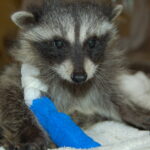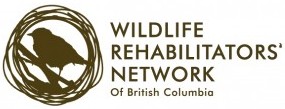
Raccoon. Photo credit: BC SPCA Wild ARC
Wildlife rehabilitation is a developing discipline, drawing from areas of growing knowledge in veterinary medicine, wildlife biology, conservation, ecology, wildlife nutrition and physiology, animal welfare, anthropology, geography, and epidemiology.
The goal of wildlife rehabilitation is to provide professional, species-specific care for injured, orphaned or pollution affected wildlife with the aim of returning the animal to full functioning (physically and behaviourally) for release back into the wild. Sadly, the injures that many wild animals face are so severe that they may not be able to be rehabilitated; in these cases wildlife rehabiltators provide the invaluable service of euthanasia – ending their suffering in a humane manner. To wildlife rehabilitators and the wild animals brought into their care, this is another form of release.
Wildlife rehabilitators work with veterinarians to provide timely medical care and diagnose injuries and potential illnesses. Caring for wild animal is very different from caring for domestic animals – and wildlife rehabilitators are able to provide appropriate housing, diets, enrichment for each species they care for. Wild animals can also be potentially dangerous or carry a variety of zoonotic diseases that present a risk to humans or other animals. Wildlife rehabilitators are trained in safe animal handling and quarantine procedures, and keep up to date with the latest emerging diseases.
In BC (and most other provinces and countries), wildlife is protected both federally (Migratory Birds Convention Act) and provincially (BC Wildlife Act and Prevention of Cruelty to Animals Act). In order to possess wildlife, dead wildlife, or wildlife parts (e.g. feathers, skulls or other parts), one MUST obtain a permit. Wildlife rehabilitators must carry rehabilitation permits to possess, treat, release and euthanize wildlife.
The BC Ministry of Natural Resource Operations issues permits for provincially regulated species (including mammals, reptiles, amphibians and most non-migratory birds). Provincial permits are processed through the Permit and Authorization Service Bureau. Permits related to the rehabilitation of migratory birds are issued through Environment Canada/Canadian Wildlife Service (c/o Gloria White, CWS, 5421 Robertson Rd, RR#1, Delta, BC, V4K 3N2, phone: 604-350-1950).
In general, to obtain a permit for a designated rehabilitation facility there must be a community need, and the individual(s) must have approved facilities for the species to be admitted, demonstrated training or experience, an established relationship with a veterinarian, liability insurance, and submit annual records of all wildlife admitted. Individuals can also apply to have permits to temporarily house and transport wildlife to designated rehabilitation facilities.
Guidelines on the care and use of wildlife for research purposes are also available through the Canadian Council on Animal Care (CCAC). The CCAC also establishes standards for humane euthanasia.
